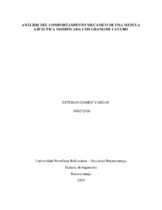Análisis del comportamiento mecánico de una mezcla alfabética modificada con grano de caucho

Ver/
Fecha
2019Autor
Gómez Vargas, Esteban
Director/Asesor
Solarte Vanegas, Norma Cristina
Tipo de contenido
bachelorThesis
Citación
Metadatos
Mostrar el registro completo del ítemDocumentos PDF
Resumen
El presente trabajo de investigación fue realizado con el fin de estudiar el desempeño mecánico y dinámico de una mezcla asfáltica semidensa MSC-25 modificada con grano de caucho residual (GCR). Para realizar el estudio fue necesario diseñar dos tipos de mezcla, convencional y modificada mediante el método Marshall planteado en las especificaciones generales de construcción de carreteras INVIAS. Antes de empezar los diseños de mezcla fue necesario que los materiales cumplieran con las especificaciones planteadas. por lo cual se llevó a cabo su respectiva caracterización. Para determinar el porcentaje óptimo de asfalto se necesitó del cálculo de diferentes parámetros volumétricos además del flujo y la estabilidad. valores que se tomaban al fallar con la prensa Marshall briquetas que contenían diferentes porcentajes de asfalto los cuales estaban en el rango del 4% al 6% para convencionales y del 5.5% a 8% para las briquetas modificadas. El porcentaje óptimo de asfalto obtenido fue del 5% para la mezcla convencional y del 6.5% para la mezcla modificada. Con estos porcentajes óptimos se procedió a la elaboración de las briquetas necesarias para la evaluación y comparación del comportamiento de ambas mezclas frente a los ensayos de tracción indirecta. la resistencia al ahuellamiento y la susceptibilidad al agua. Los resultados obtenidos demuestran que la mezcla modificada presenta una mejora del 5% frente a la susceptibilidad al agua además de presentar una mejor adherencia de los agregados con el asfalto, en cuanto la resistencia al ahuellamiento la profundidad máxima de la mezcla convencional fue de 1.1 mm mientras que la mezcla modificada solo presento un ahuellamiento de 0.39 mm. Los módulos resilientes obtenidos en el ensayo de tracción indirecta indican que la mezcla modificada es menos rigida que la mezcla convencional, presentado en si una mezcla asfáltica más flexible frente a las cargas dinámicas. The present research work was carried out in order to study the mechanical and dynamic performance of a MSC-25 semi-dense asphalt mix modified with residual rubber grain (GCR). To carry out the study it was necessary to design two types of mixture, conventional and modified by the Marshall method proposed in the general construction specifications of INVIAS roads. Before starting the mixing designs, it was necessary for the materials to comply with the proposed specifications, for which reason their respective characterization was carried out. To determine the optimum percentage of asphalt it was necessary to calculate different volumetric parameters in addition to flow and stability, values that were taken when failing with the Marshall press briquettes containing different percentages of asphalt which were in the range of 4% to 6%. % for conventional and from 53% to 8% for modified briquettes. The optimum percentage of asphalt obtained was 5% for the conventional mixture and 63% for the modified mixture. With these optimum percentages, the briquettes necessary for the evaluation and comparison of the behavior of both mixtures were compared to the indirect tensile tests, the resistance to rutting and the susceptibility to water. The results obtained show that the modified mixture presents an improvement of 5% against the water susceptibility in addition to presenting a better adherence of the aggregates with the asphalt. as the resistance to rutting the maximum depth of the conventional mixture was 1.1 mm while the modified mixture only showed a rut of 0.39 mm. The resilient modules obtained in the indirect tensile test indicate that the modified mixture is less rigid than the conventional mixture, presented in itself a more flexible asphalt mixture compared to the dynamic loads.
Palabra/s clave
Mezcla asfáltica
Ahuellamiento
Caucho
Módulo resiliente
Susceptibilidad
Colecciones
- Trabajos de grado [6688]
El ítem tiene asociados los siguientes ficheros de licencia:

